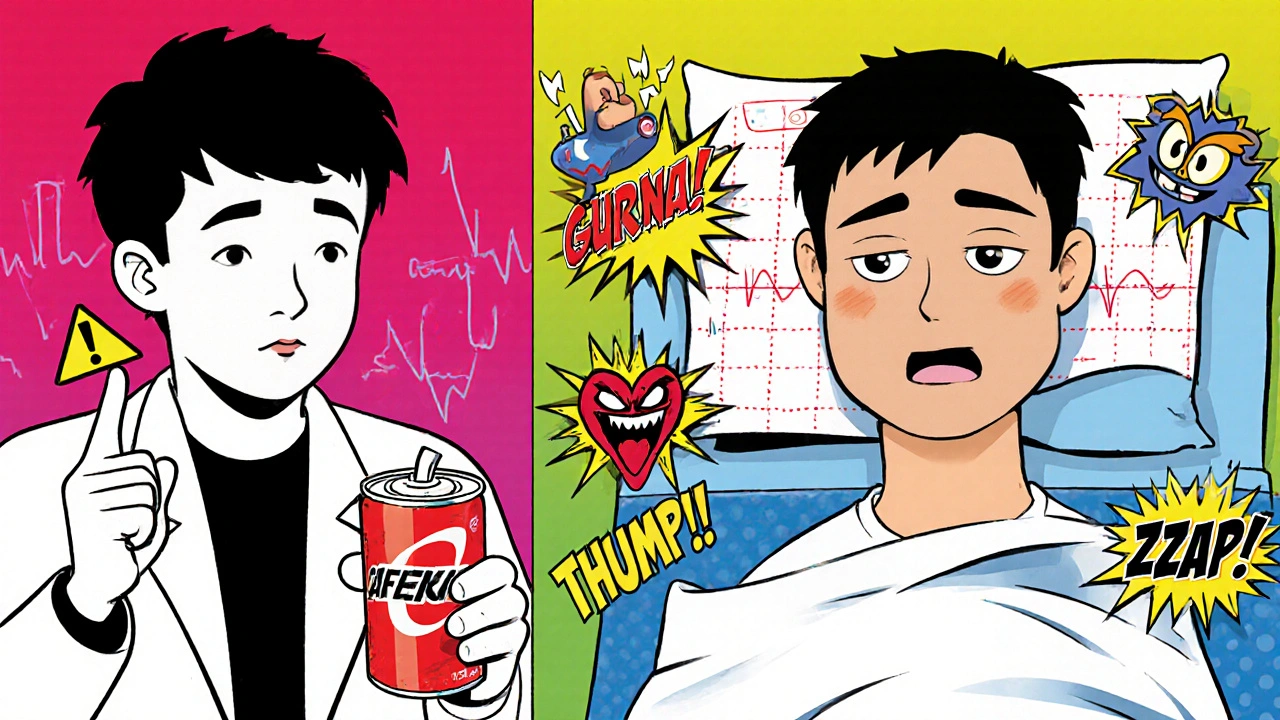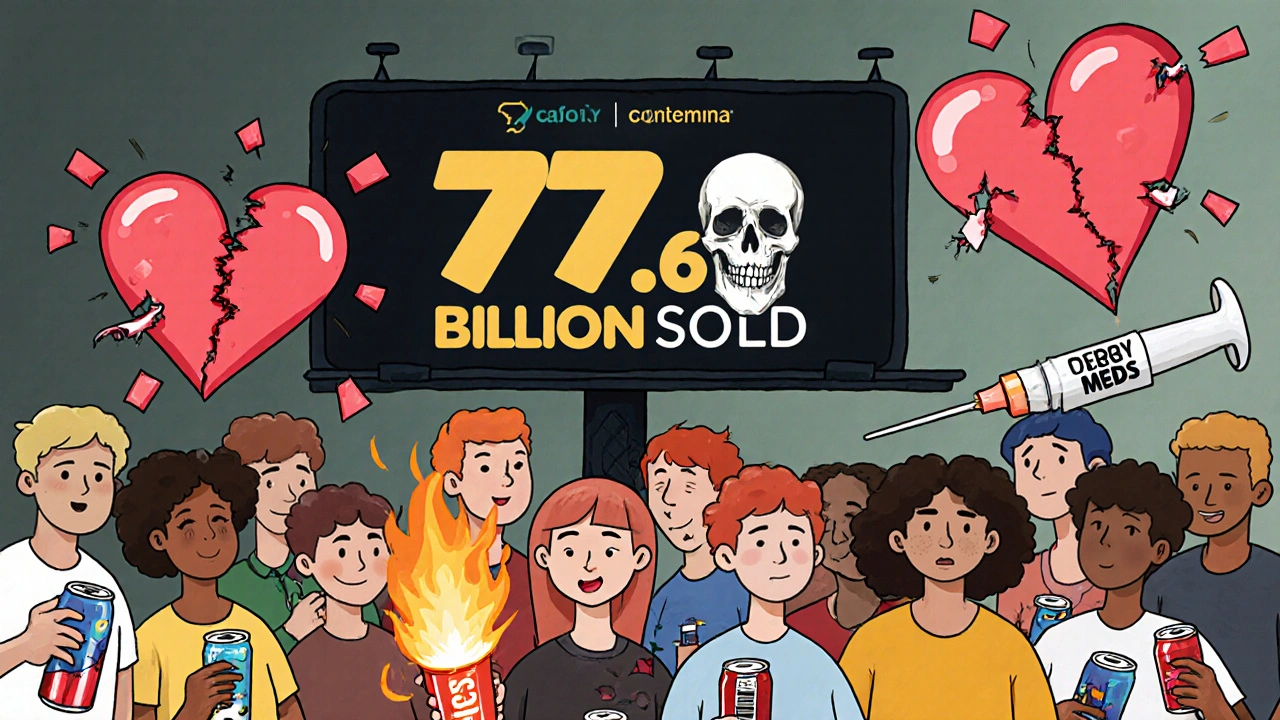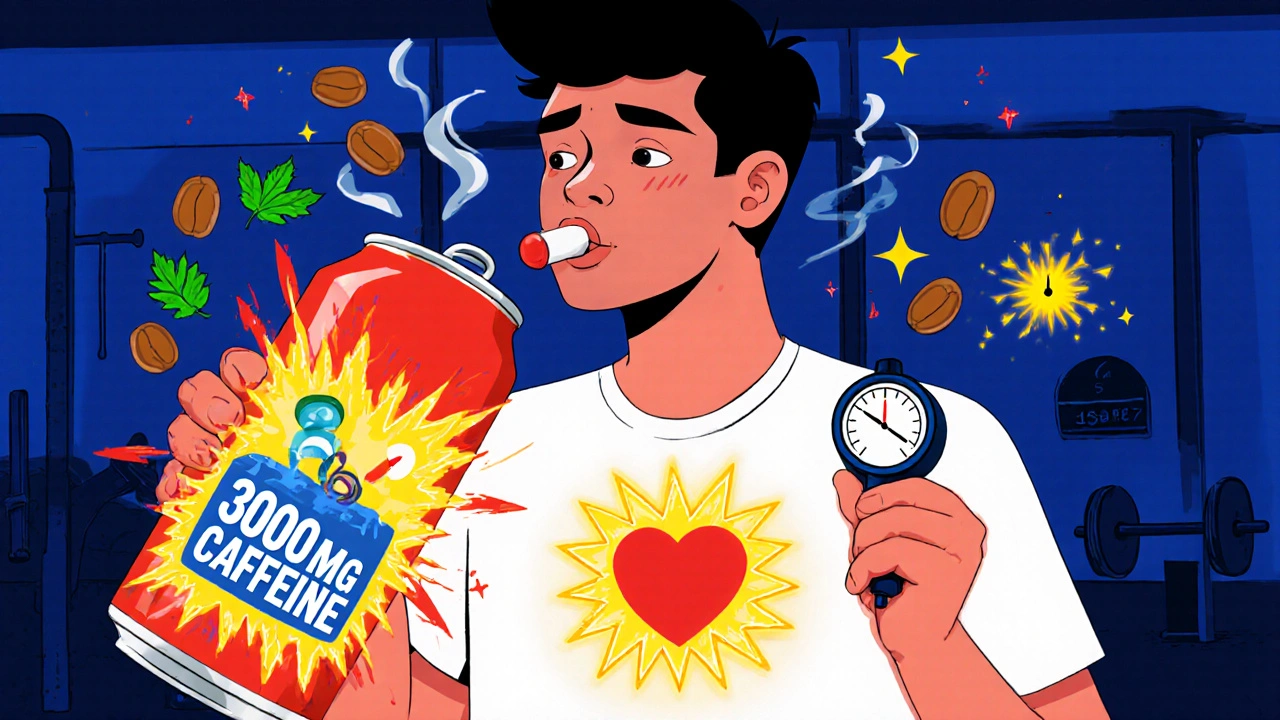Energy Drink & Stimulant Risk Calculator
This calculator helps you understand your risk of heart and blood pressure issues from energy drinks and stimulant medications based on scientific data from the article.
When you down a can of energy drink before a workout, or mix it with your ADHD medication, you might think you’re just boosting focus or energy. But what you’re really doing is putting your heart under stress - and the numbers don’t lie.
What’s Really in Energy Drinks?
Energy drinks aren’t just coffee in a can. A single 16-ounce can of Monster Energy has 160 mg of caffeine. Bang Energy? 300 mg. That’s more than three cups of brewed coffee. But caffeine isn’t even the whole story. These drinks also pack in guarana - a plant seed that’s 3.6% to 5.8% caffeine by weight - so you’re getting extra caffeine you don’t even see on the label. Then there’s taurine, bitter orange (which contains synephrine), and sugar or artificial sweeteners. All of these work together to speed up your heart and tighten your blood vessels.
It’s not just about the caffeine. Studies show that the mix of stimulants in these drinks causes blood pressure to spike faster and higher than caffeine alone. In one Mayo Clinic study, healthy young adults saw their systolic blood pressure rise by 6.2% within 30 minutes of drinking a 240 mg caffeine energy drink. Adrenaline levels jumped nearly 75%. That’s not a mild buzz - that’s your body reacting like it’s under attack.
Stimulant Medications: The Hidden Danger
If you’re taking Adderall, Ritalin, or another prescription stimulant for ADHD, you’re already putting strain on your cardiovascular system. These medications raise heart rate by 3 to 13 beats per minute and increase systolic blood pressure by 2 to 7 mmHg. That’s normal for someone on them - but add an energy drink on top, and you’re doubling down on the stress.
Doctors have seen patients come in with heart palpitations, chest tightness, and dangerously high blood pressure after combining their ADHD meds with energy drinks. One case study in the Journal of the American Heart Association described a 22-year-old man who took Adderall and then drank two energy drinks before a workout. He ended up in the ER with a heart rhythm disorder called ventricular tachycardia. He had no prior heart issues. Just the combination did it.
The problem isn’t just one drink and one pill. It’s the cumulative effect. Both caffeine and amphetamines stimulate the same parts of your nervous system. When they team up, your heart doesn’t know how to respond. It just keeps racing.
Who’s at the Highest Risk?
You might think only older people or those with heart disease are in danger. But that’s not true. Young, healthy people are getting hurt too.
The CDC reports that between 2017 and 2023, emergency room visits for caffeine overdose more than doubled in middle school kids. In 2011, nearly 1,500 teens aged 12 to 17 visited ERs because of energy drink-related issues - mostly heart palpitations, anxiety, and high blood pressure. Today, 30% to 50% of adolescents still drink them regularly, despite the American Academy of Pediatrics saying they should avoid them entirely.
And it’s not just teens. Adults with undiagnosed high blood pressure or early heart disease are also at risk. Many don’t know they have it until an energy drink triggers a spike that leads to a panic attack, chest pain, or worse. One Reddit user, u/BloodPressureWatcher, documented his own experience: his blood pressure jumped from 120/80 to 145/95 after one 300 mg energy drink. That’s not a fluke. That’s a warning sign.

The Numbers Don’t Lie: What the Data Shows
Here’s what real studies say about the impact:
| Group | Change in Systolic BP | Change in Heart Rate | Time Frame |
|---|---|---|---|
| Healthy adults after 1 energy drink (240 mg caffeine) | +6.2% | +10-15 bpm | 30 minutes |
| Adults on Adderall + energy drink | +10-15 mmHg | +15-25 bpm | 1 hour |
| Adolescents consuming 300+ mg caffeine | +15-20 mmHg | +20+ bpm | Within 45 minutes |
| Patients with pre-existing hypertension | +20-30 mmHg | +25-40 bpm | Variable |
These aren’t hypothetical numbers. They come from peer-reviewed studies, ER records, and patient logs. The worst outcomes include arrhythmias, heart attacks, and even aortic dissections - rare but deadly events that have been directly linked to energy drink use.
What You Should Do
If you’re taking stimulant medication, avoid energy drinks entirely. There’s no safe combo. Even one can can push your system past its limit.
If you’re not on medication but drink energy drinks regularly, ask yourself:
- Do you feel your heart racing after one?
- Do you get headaches, dizziness, or chest tightness?
- Do you need more and more to feel the same effect?
If you answered yes to any of these, your body is already signaling trouble. The FDA says 400 mg of caffeine per day is safe for healthy adults - but that’s a general guideline. If you’re sensitive, have high blood pressure, or take any medication, that number drops to 100 mg or less.
And don’t assume “sugar-free” or “natural” energy drinks are safer. They often have the same or higher caffeine levels. Some even contain more synephrine - a stimulant that’s been banned in some countries because of its heart risks.

Warning Signs You Can’t Ignore
If you’ve had an energy drink or taken stimulant meds and experience any of these, seek help immediately:
- Chest pain or pressure
- Heart palpitations lasting more than 5 minutes
- Difficulty breathing
- Sudden severe headache
- Blurred vision or dizziness
- Nausea or vomiting with heart symptoms
These aren’t normal side effects. They’re red flags. Emergency rooms see these cases every week. You don’t need to wait until it’s an emergency to get help.
How to Cut Back Safely
If you’re a regular energy drink user, quitting cold turkey can cause headaches, fatigue, and irritability for up to 9 days. Instead, try this:
- Reduce by one can per week.
- Switch to black coffee or green tea - lower caffeine, no added stimulants.
- Hydrate with water or electrolyte drinks if you’re using energy drinks for energy.
- Get better sleep. Most people use energy drinks because they’re tired - fix the root cause.
- Track your heart rate with a smartwatch. If it’s consistently over 100 bpm at rest, talk to your doctor.
The goal isn’t to scare you. It’s to make you aware. Energy drinks aren’t harmless snacks. They’re powerful stimulants. And when paired with prescription meds, the risks aren’t just theoretical - they’re documented, measured, and real.
What Experts Are Saying Now
The American Heart Association’s March 2024 statement is clear: people with known heart disease should avoid energy drinks completely. Harvard Medical School’s Dr. Pieter Cohen says stimulants make the heart beat harder and faster - and that’s especially dangerous for older adults or those with hidden heart conditions.
And it’s not just about one drink. A 2024 UC Davis Health study found that regular energy drink use may damage the lining of blood vessels - the first step toward heart disease. That’s not something you can reverse overnight.
The market is growing. Sales hit $77.6 billion globally in 2023. But more sales don’t mean safer products. In fact, lawsuits are rising. In 2022, a 19-year-old in California suffered a heart attack after drinking three Monster Energy drinks in two hours. His family sued. The case is still ongoing.
These aren’t isolated incidents. They’re symptoms of a larger problem: we treat energy drinks like soda, but they act like medicine - and sometimes, like poison.
Can energy drinks cause heart attacks in healthy people?
Yes. While rare, there are documented cases of healthy young adults suffering heart attacks after consuming multiple energy drinks - especially when combined with physical exertion or stimulant medications. The combination of high caffeine, synephrine, and adrenaline spikes can trigger coronary spasms or dangerous arrhythmias even in people with no prior heart issues.
Is it safe to drink one energy drink while taking Adderall?
No. Even one energy drink can dangerously increase your heart rate and blood pressure when combined with Adderall or other stimulant medications. The effects are additive, not just combined. Medical experts strongly advise against mixing them. If you’re on stimulants, avoid energy drinks entirely.
How much caffeine is too much if I’m on ADHD meds?
If you’re taking stimulant medication, limit caffeine to under 100 mg per day - about one small cup of coffee. Most energy drinks contain 160 mg or more. Even one can can push you over the safe limit. Your body is already being stimulated by the medication; adding more caffeine increases the risk of heart rhythm problems and high blood pressure.
Do sugar-free energy drinks have less risk?
No. Sugar-free energy drinks often contain the same or higher levels of caffeine and stimulants like synephrine and guarana. Removing sugar doesn’t reduce the cardiovascular risk - it just removes one health concern while keeping the dangerous ones. The stimulant content is what causes the heart risks, not the sugar.
What should I do if I feel my heart racing after an energy drink?
Stop drinking it immediately. Sit down, take slow, deep breaths, and drink water. If your heart keeps racing for more than 5 minutes, or you feel chest pain, dizziness, or trouble breathing, call emergency services. Don’t wait. These symptoms can be signs of a serious heart event.
Are there safer alternatives to energy drinks for focus and energy?
Yes. Black coffee (1-2 cups), green tea, water with electrolytes, and adequate sleep are safer and more sustainable. If you’re using energy drinks for mental focus, talk to your doctor about adjusting your ADHD medication instead of adding stimulants. Exercise, even a 10-minute walk, can also boost alertness without the risks.
Energy drinks and stimulant medications are a dangerous mix - not because they’re illegal, but because they’re misunderstood. They’re not energy boosters. They’re cardiovascular stress tests. And your heart doesn’t get a second chance.


All Comments
Emily Barfield November 1, 2025
So we’re just supposed to accept that our bodies are tiny, fragile vessels being pummeled by corporate-designed chemical cocktails disguised as ‘energy’?!! It’s not just caffeine-it’s a symphony of neurotoxins, each note a slap to the vagus nerve, each can a slow-motion cardiac rebellion… and we cheer?!! We post memes about ‘hustle culture’ while our hearts stutter like a failing hard drive!!
Who designed this? Who signed off on it? Why does the FDA treat stimulants like candy?!!
Sai Ahmed November 3, 2025
They’re hiding something. The real reason energy drinks are legal is because the military uses them to keep drone operators awake. Same formula. Same ingredients. They don’t want you to know that your ‘study fuel’ is basically a battlefield stimulant. The heart palpitations? That’s your body screaming it’s not meant for this. The government knows. They just don’t care.
Albert Schueller November 4, 2025
People need to stop being so reckless. I work in healthcare. I’ve seen the ER logs. Energy drinks + Adderall = a walking time bomb. And no, ‘I’m young and healthy’ doesn’t matter. My cousin, 24, ran a marathon after two Bangs and an Adderall. Got a myocardial infarction. No prior symptoms. Just… gone. You think you’re invincible? You’re not. You’re just lucky so far.
Ted Carr November 5, 2025
Wow. A 2,000-word essay on why energy drinks are bad. Next you’ll tell me water is dangerous if you drink too much. Groundbreaking. I’m sure the FDA is trembling.
Rebecca Parkos November 6, 2025
THIS. IS. EVERYTHING. I used to chug Monster before my shifts because I was exhausted. Then I started having panic attacks that felt like my chest was being crushed. I thought I was losing my mind. Turns out my BP spiked to 168/102 after one can. I quit cold turkey. My anxiety dropped 80%. I’m not mad-I’m relieved. If you’re reading this and you’re still drinking them? Stop. Now. Your heart doesn’t owe you another day.
Bradley Mulliner November 7, 2025
People who drink energy drinks are just lazy. They’d rather chemically hack their way through life than get enough sleep or eat properly. It’s not a medical issue-it’s a moral failure. You want energy? Get up earlier. Walk. Breathe. Stop outsourcing your vitality to a can of neon poison. You’re not a machine. You’re a human being with a heartbeat that deserves better than this.
Rahul hossain November 7, 2025
Let me tell you something about the energy drink industry: it’s a pyramid of deception wrapped in neon and marketed as ‘extreme.’ The real winners? Not the consumers. Not the athletes. The shareholders. The same people who sold you ‘diet’ soda and told you it was healthy. They don’t care if your heart skips a beat-they care if your quarterly sales tick up. The science? Irrelevant. The profit? Everything.
Reginald Maarten November 8, 2025
Actually, the 400 mg daily caffeine limit is based on a 2003 EFSA assessment, not FDA guidelines, and it assumes no concurrent stimulant use. When combined with amphetamines, the pharmacokinetic interaction is nonlinear, meaning the risk doesn’t scale linearly-it escalates exponentially due to CYP1A2 enzyme inhibition. Also, synephrine is not banned in the U.S.-it’s regulated under the Dietary Supplement Health and Education Act (DSHEA), which allows it precisely because it’s classified as a ‘supplement,’ not a drug. This is a regulatory loophole, not a safety endorsement.
Jonathan Debo November 10, 2025
It’s not just the caffeine. It’s the psychological conditioning. We’ve been trained to believe that ‘peak performance’ requires chemical intervention. That’s not innovation-it’s addiction disguised as optimization. And the fact that we accept this as normal? That’s the real tragedy. We’ve normalized self-harm in the name of productivity. We wear our exhaustion like a badge. And now we’re surprised when our hearts give out? Please. We knew this was coming. We just didn’t care enough to stop.
Robin Annison November 10, 2025
I used to think energy drinks were harmless. Then I started tracking my heart rate with my Apple Watch. After one drink, my resting HR went from 62 to 98 within 20 minutes. I didn’t feel anything. No jitters, no anxiety. Just… higher. That scared me more than any chest pain ever could. I switched to green tea. My sleep improved. My focus improved. I didn’t need the crash. I didn’t need the hype. I just needed to listen. Maybe we all do.